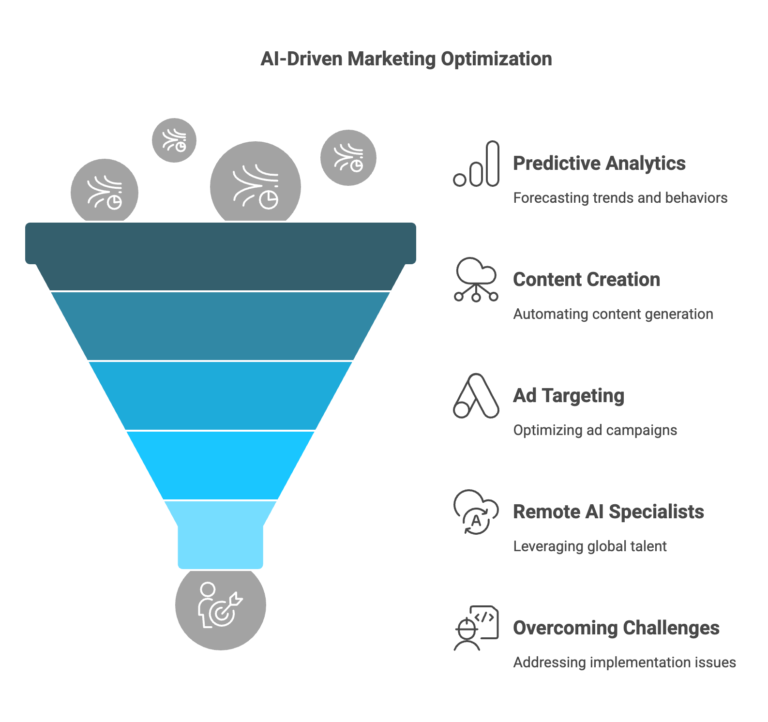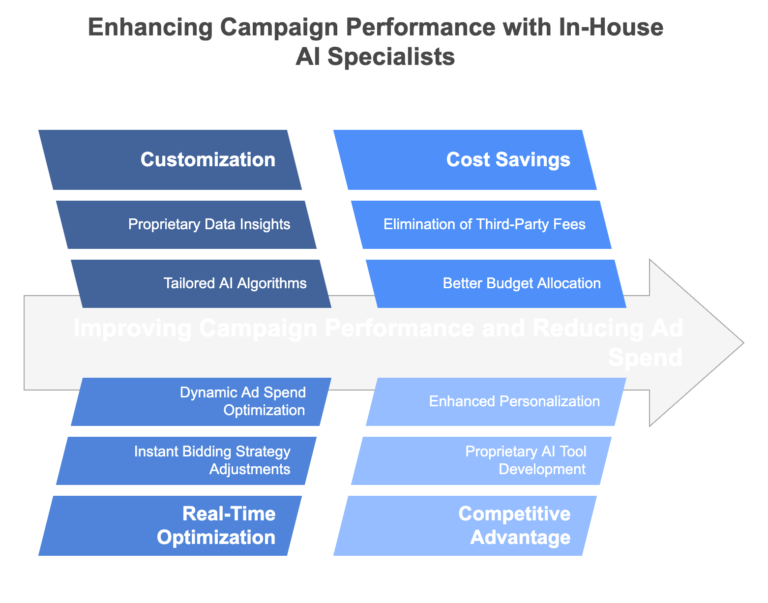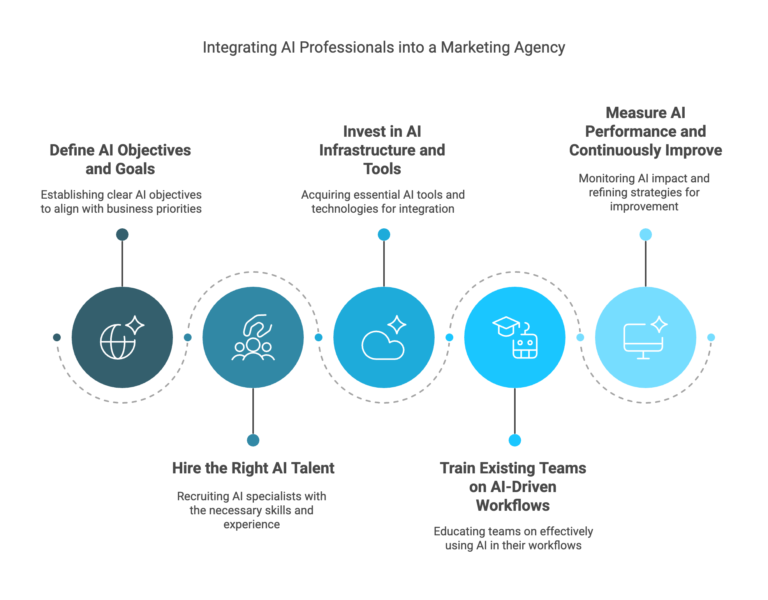Introduction
Artificial intelligence (AI) is no longer a futuristic concept—it’s an essential tool for digital marketing agencies that want to stay competitive. From predictive analytics and automated content creation to hyper-personalized ad targeting, AI has revolutionized the way agencies run campaigns. Yet, many agencies make the mistake of outsourcing AI capabilities to third-party firms, which often results in subpar performance, rising costs, and a lack of strategic control.
We’ll explore why digital marketing agencies should invest in an in-house AI specialist rather than relying on external firms. We’ll break down the benefits of AI-driven marketing strategies, how an in-house AI specialist can improve campaign performance and reduce ad spend, and the risks of outsourcing AI talent. Finally, we’ll provide a roadmap for integrating AI professionals into your agency for maximum impact.
AI-Driven Marketing Strategies: Transforming Campaign Success
AI has changed the way digital marketing agencies execute campaigns, offering tools and capabilities that were unimaginable just a few years ago. Below are some of the most powerful AI-driven marketing strategies that agencies can leverage.
1. Predictive Analytics for Smarter Decision-Making
AI can analyze massive amounts of data to forecast future trends, customer behaviors, and campaign performance. Agencies can use predictive analytics to:
Optimize ad spend by targeting high-converting audiences.
Identify seasonal trends and adjust marketing strategies accordingly.
Improve customer segmentation and personalize content for different audience groups.
Reduce churn rates by identifying patterns in customer behavior that indicate disengagement.
Predict market trends that can inform content creation and product launches.
Improve lead scoring accuracy, allowing sales teams to focus on the highest-value prospects.
Automate real-time decision-making, helping brands react faster to market changes.
2. Automated Content Creation & Personalization
AI-powered tools like GPT-driven chatbots, automated copywriting platforms, and image generation software allow agencies to produce high-quality content at scale. AI can:
Generate blog posts, ad copy, and social media content with minimal human intervention.
Personalize email marketing campaigns based on user behavior and engagement data.
Automate A/B testing for headlines, visuals, and call-to-actions.
Optimize content for SEO by analyzing keyword effectiveness and competitor performance.
Scale video content production by using AI-powered video editing tools.
Adjust content dynamically based on real-time user interactions.
Improve language translation and localization for global audiences.
3. AI-Enhanced Ad Targeting & Bidding
AI can optimize pay-per-click (PPC) and social media ad campaigns in real time by:
Dynamically adjusting bids based on audience behavior.
Identifying the most profitable customer segments.
Reducing ad waste by eliminating low-performing placements.
Enhancing audience retargeting strategies through AI-driven intent recognition.
Identifying fraud patterns in ad clicks, reducing wasted spend on bot traffic.
Improving ad creative effectiveness by analyzing engagement data.
Optimizing campaign budgets by predicting which channels will yield the best ROI.
4. Why Remote AI Specialists Are a Game-Changer
Bringing AI expertise in-house is crucial, but hiring remote AI specialists can offer even greater advantages. A remote AI specialist:
Provides access to a global talent pool, ensuring top-tier expertise.
Saves on overhead costs compared to hiring an in-office AI engineer.
Allows agencies to scale AI implementation quickly without geographical constraints.
Enables 24/7 campaign optimization by leveraging talent across multiple time zones.
Reduces time-to-hire compared to traditional recruiting methods.
Supports a more agile work environment, reducing operational inefficiencies.
Enhances diversity by bringing in AI professionals from different backgrounds and experiences.
5. Overcoming AI Implementation Challenges
Despite its benefits, integrating AI into a digital marketing agency isn’t without obstacles. Some of the most common challenges include:
Lack of AI expertise: Agencies that rely on third-party vendors often miss out on developing internal AI knowledge, making them dependent on external support.
Resistance to change: Teams accustomed to traditional marketing methods may be hesitant to adopt AI-driven processes.
Data silos: Many agencies struggle to centralize their data, which limits AI’s ability to make informed decisions.
High implementation costs: While AI tools can reduce costs over time, initial setup expenses—such as training models and acquiring software—can be high.
Security risks: AI implementation requires access to vast amounts of customer data, increasing the risk of breaches if proper cybersecurity measures aren’t in place.
To address these challenges, agencies need a well-defined AI adoption strategy that includes training, technology investments, and a clear roadmap for integrating AI-driven solutions into their workflows.
These AI-driven capabilities give agencies a significant edge, but only if they are implemented correctly—something that’s difficult to achieve when outsourcing AI solutions to third-party firms.

How an In-House AI Specialist Improves Campaign Performance and Reduces Ad Spend
Having an in-house AI specialist is more than just an upgrade—it’s a strategic move that can significantly impact a digital marketing agency’s bottom line. Unlike third-party firms that apply broad, one-size-fits-all AI solutions, an in-house AI specialist can tailor machine learning models and automation tools specifically to your agency’s unique challenges and client needs. This level of customization leads to improved campaign performance, better return on ad spend (ROAS), and a stronger competitive advantage.
1. Increased Customization and Strategy Control
When AI is outsourced, agencies often receive pre-built models and generic automation tools that lack flexibility. An in-house AI specialist provides:
Customized AI algorithms that align with specific campaign goals and industries.
Seamless integration with the agency’s existing tech stack, including CRM, analytics platforms, and marketing automation tools.
Continuous refinement of AI models, ensuring optimization for performance rather than relying on outdated third-party models.
Ownership of proprietary data insights, which can be leveraged for a competitive edge.
Ability to train AI models on niche audiences, improving targeting and engagement.
By hiring an AI specialist in-house, agencies gain the ability to fine-tune campaigns with greater precision, leading to higher conversion rates and lower acquisition costs.
2. Real-Time Optimization and Faster Decision-Making
Outsourcing AI capabilities often results in communication delays, making it difficult to react quickly to changes in campaign performance. An in-house AI specialist can:
Monitor AI-driven campaigns in real-time and adjust bidding strategies instantly.
Identify cost inefficiencies and optimize ad spend dynamically.
Implement machine learning models that evolve based on historical campaign performance.
Automate decision-making to improve ROAS (Return on Ad Spend).
Reduce reliance on external data sources, ensuring a more consistent and accurate approach to analytics.
Having a dedicated AI expert on your team ensures that campaigns remain agile, adaptable, and profitable, even in highly competitive digital advertising environments.
3. Long-Term Cost Savings
While hiring an in-house AI specialist requires an initial investment, the long-term financial benefits outweigh the costs. Consider these advantages:
Elimination of third-party fees: Agencies avoid recurring fees charged by AI outsourcing firms.
Full data ownership: No risk of losing valuable insights to third-party vendors.
Better budget allocation: AI-driven automation reduces the need for excessive manual campaign adjustments, allowing agencies to focus on growth.
Reduction in external vendor dependencies, improving overall business agility.
Lower long-term ad spend by refining audience segmentation and reducing wasted clicks on ineffective ad placements.
4. Competitive Advantage Through Proprietary AI Development
AI is a game-changer in marketing, but if every agency uses the same third-party tools, differentiation becomes difficult. By hiring an AI expert in-house, agencies can:
Develop proprietary AI tools that set them apart from competitors.
Enhance personalization in campaigns through deeper audience insights.
Improve efficiency and reduce costs by automating repetitive marketing tasks.
Build unique machine learning models tailored to their clientele’s needs.
Adapt faster to changes in platform algorithms, such as Google’s search ranking factors or Facebook’s ad bidding mechanisms.
With an AI expert developing and optimizing campaigns internally, agencies can innovate faster and deliver more effective solutions to clients.
5. The Power of Remote AI Specialists
One of the best ways to integrate AI talent is by hiring remote specialists. Remote AI professionals offer:
Access to top-tier talent beyond local hiring limitations.
Lower salary and operational costs compared to on-site hiring.
24/7 operational flexibility, allowing agencies to optimize campaigns across multiple time zones.
Scalability to add AI expertise without expanding office space.
Better work-life balance for AI specialists, leading to higher job satisfaction and productivity.
By hiring AI talent remotely, agencies can scale their AI capabilities faster while keeping costs manageable. Cloud-based AI solutions and remote collaboration tools make it seamless to integrate remote specialists into an agency’s team structure.
6. Why Some Agencies Resist Hiring AI In-House (And Why That’s a Mistake)
Despite the clear advantages of bringing AI talent in-house, some agencies hesitate due to perceived barriers. Here are the most common concerns and why they shouldn’t hold your agency back:
Concern 1: High Initial Costs
While AI specialists command competitive salaries, the investment quickly pays off in long-term cost savings and efficiency improvements.
Agencies can start by hiring a remote AI expert, reducing salary and operational expenses.
Concern 2: Lack of Internal AI Knowledge
Many agency owners worry they don’t understand AI well enough to manage an in-house specialist.
The key is hiring an AI professional with experience in marketing applications who can bridge the gap between data science and advertising.
Concern 3: Fear of Job Redundancy for Existing Teams
AI does not replace human creativity—it enhances it. Marketing teams still need strategists, designers, and copywriters, but AI helps them work smarter.
By offloading repetitive data-driven tasks to AI, teams can focus on innovation and strategy.
Agencies that overcome these fears and invest in AI talent now will be ahead of the curve, while those that continue relying on third-party AI firms risk falling behind.

The Downsides of Relying on Third-Party AI Firms
While outsourcing AI capabilities might seem like an easy and cost-effective solution, many digital marketing agencies quickly realize the significant drawbacks of relying on third-party AI firms. Outsourcing can introduce inefficiencies, limit customization, and reduce the agency’s ability to innovate. Here are some key reasons why depending on external AI providers can be a costly mistake.
1. Lack of Transparency and Control
When agencies rely on third-party AI providers, they often have little visibility into how AI-driven decisions are made. This lack of transparency can cause several problems:
Black-box algorithms: Many AI firms use proprietary models that agencies cannot modify or audit.
Limited control over campaign optimization: Agencies must rely on external vendors to make adjustments, which can slow down response times.
Inflexibility in strategy: AI providers may apply standardized solutions that are not tailored to an agency’s specific client needs.
Without full control over AI-driven processes, agencies struggle to make real-time decisions and adjust their campaigns effectively.
2. Hidden Costs and Unpredictable Expenses
Outsourcing AI services often comes with hidden costs that agencies may not initially anticipate:
High subscription or licensing fees that increase as the agency scales.
Additional costs for premium AI features such as advanced machine learning models or real-time data processing.
Integration challenges that require expensive API connections and development work.
Costly dependencies: Once an agency becomes reliant on a third-party AI firm, switching providers or bringing AI in-house later can be costly and time-consuming.
By contrast, hiring an in-house AI specialist allows agencies to build and maintain their own AI solutions without being locked into expensive vendor contracts.
3. Limited Customization and Competitive Differentiation
Most third-party AI firms provide standardized tools designed to serve a broad customer base. This can lead to generic AI implementations that fail to create a competitive advantage for an agency. Key issues include:
Lack of industry-specific optimizations: AI models may not be trained to serve niche markets or specialized client needs.
Minimal personalization options: Agencies cannot modify AI-driven strategies to match their branding and messaging requirements.
Standardized analytics: Many AI providers offer predefined reporting metrics that do not align with an agency’s KPIs.
When AI is developed in-house, agencies can tailor solutions to meet their exact needs, providing more value to clients and differentiating themselves from competitors.
4. Data Privacy and Security Risks
Data security is a major concern when outsourcing AI functions. Agencies that work with sensitive customer data risk exposing proprietary insights to third parties. Major security risks include:
Potential data leaks due to AI providers using shared machine learning models across multiple clients.
Compliance concerns with regulations like GDPR, CCPA, and HIPAA when handling customer data.
Loss of ownership over valuable campaign insights if AI providers restrict access to raw data.
By keeping AI operations in-house, agencies can ensure full data ownership and compliance with security best practices.
How to Integrate AI Professionals Into Your Agency
Making the transition from outsourcing AI to developing in-house capabilities requires a strategic approach. Below is a step-by-step roadmap for successfully integrating AI talent into a digital marketing agency.
Step 1: Define AI Objectives and Goals
Before hiring an AI specialist, agencies should determine their core objectives. Consider the following questions:
What specific marketing challenges will AI help solve?
Will AI be used primarily for automation, data analysis, or personalization?
How will AI fit into the agency’s current workflows?
Having clear goals ensures that AI efforts align with business priorities and deliver measurable value.
Step 2: Hire the Right AI Talent
Hiring an AI professional with expertise in marketing is crucial for a successful transition. When recruiting AI specialists, agencies should look for candidates with:
Strong backgrounds in machine learning and data science.
Experience working with marketing analytics tools.
Proficiency in programming languages such as Python, R, and SQL.
Knowledge of digital advertising platforms (Google Ads, Meta Ads, programmatic advertising tools).
Additionally, agencies can explore hiring remote AI specialists, which expands access to top-tier talent while reducing overhead costs.
Step 3: Invest in AI Infrastructure and Tools
To effectively integrate AI, agencies must invest in the right tools and technologies. Key components include:
Cloud-based AI platforms (Google Cloud AI, AWS AI, Azure AI) for scalable machine learning.
Marketing automation tools (HubSpot, Marketo, Pardot) that integrate with AI-driven insights.
Data analytics platforms (Tableau, Google Analytics, Power BI) for AI-powered reporting.
Step 4: Train Existing Teams on AI-Driven Workflows
AI should enhance—not replace—the work of marketing professionals. Agencies should educate their teams on how to leverage AI effectively, including:
How AI can assist with content creation and personalization.
Using AI-powered analytics for campaign optimization.
Best practices for AI-driven audience targeting and segmentation.
Training sessions, workshops, and ongoing learning programs will ensure that AI is integrated seamlessly into daily workflows.
Step 5: Measure AI Performance and Continuously Improve
Once AI is fully integrated into the agency, it’s important to track its impact and refine strategies over time. Agencies should monitor:
Campaign performance metrics, such as engagement rates, conversion rates, and ROAS.
Cost savings and efficiency improvements resulting from AI automation.
Client satisfaction and retention rates to ensure AI-driven strategies are delivering value.
By continuously optimizing AI models and adapting to industry trends, agencies can maintain a competitive edge and maximize their return on investment.

Conclusion: The Future of AI in Digital Marketing Belongs In-House
AI is transforming the digital marketing industry, but agencies that rely on third-party AI firms risk losing control over strategy, performance, and costs. By hiring in-house AI specialists, agencies can:
Take full control of AI-driven marketing strategies.
Improve campaign efficiency and reduce ad spend.
Ensure data privacy and compliance with security regulations.
Differentiate themselves by developing proprietary AI tools.
The future of digital marketing belongs to agencies that harness AI as a core part of their team. Don’t let your agency fall behind—invest in AI talent today.

